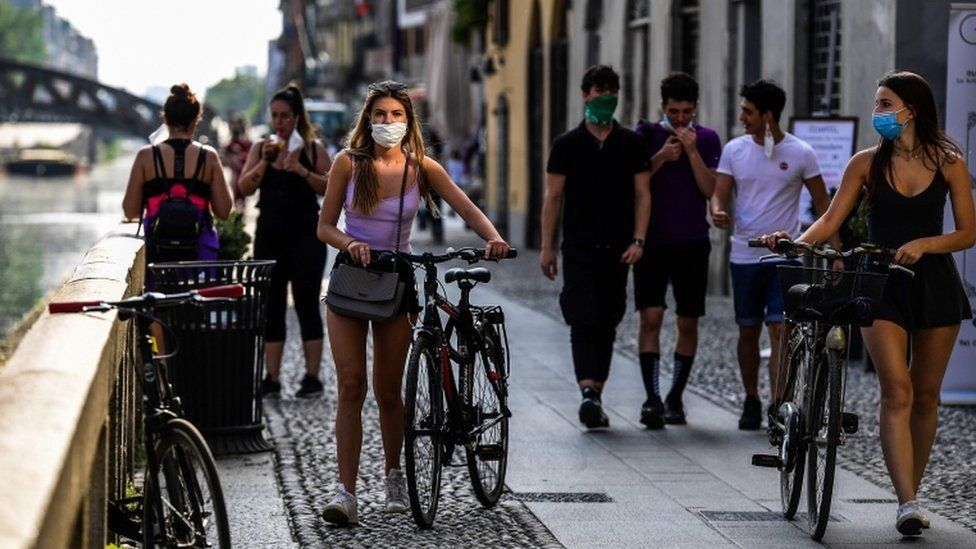Coronavirus: Italy death toll tops 30,000, highest in EU
- Published

Italy has become the first country in the European Union to register more than 30,000 coronavirus-related deaths.
It reported 243 new fatalities on Friday - down from 274 the day before - taking the total to 30,201.
The daily number of confirmed new cases fell slightly to 1,327, bringing the total number of infections to 217,185.
Restrictions have begun to ease around the county, but one doctor described the city of Milan as a "time bomb", according to local media.
Italy has the third highest number of officially recorded coronavirus deaths in the world, after the United States and the UK - which is no longer a member of the EU.
Britain passed the 30,000 mark on Wednesday. Spain is Europe's third worst-affected country with more than 26,000 deaths.
Italy was the first country in Europe to impose a lockdown when coronavirus cases began to surface in northern regions in February.
Some lockdown measures have been rolled back. This week, Italians have been able to exercise for the first time in weeks, as long as they respect rules on physical distance and wear masks where distancing is difficult. They are able to visit relatives - but not friends - within their region.
Catholic churches are also preparing for the resumption of Mass on 18 May, but there will be strict social distancing and worshippers must wear face masks. Other faiths will also be allowed to hold religious services.
However, schools, cinemas and most shops will stay shut, and all public gatherings are still banned. Bars and restaurants are due to start allowing customers to sit at tables in June.
While some restrictions remain in place, images shared on social media show people in busy areas ignoring distancing rules and not wearing protective masks, leading to an outcry.
Massimo Galli, head of the infectious diseases department at Milan's Sacco hospital, told La Reppublica newspaper it was clear that lockdown easing "may present problems".
He said: "We have a very high number of infected people returning to circulation."
Coronavirus commissioner Angelo Borrelli warned the public that containment measures would "be stiffened" if the virus showed signs of taking off again.
"We are monitoring things carefully," he said on Thursday.
"We risked everything to survive" - Naples resident Filomena
Police in the capital Rome said they were setting up checkpoints on roads leading to the coast, lakes and tourist spots in the countryside over the weekend.
They said they would also be monitoring areas where nightlife is popular.
The Mayor of Milan, Giuseppe Sala, issued an "ultimatum" on Friday after footage emerged of crowds of people - most of them young - adopting neither face masks or social distancing in the city's popular Navigli area.
Milan, the capital of the Lombardy region, was the epicentre of the Italian outbreak.
"I will take measures, I will close the Navigli," Mr Sala threatened, describing the scenes as "disgraceful".
Allow Twitter content?
This article contains content provided by Twitter. We ask for your permission before anything is loaded, as they may be using cookies and other technologies. You may want to read Twitter’s cookie policy, external and privacy policy, external before accepting. To view this content choose ‘accept and continue’.
In another development, an Italian government agency has warned that the cash-starved tourism industry is vulnerable to incursions by mafia organisations as the lockdown eases.
A report by the Covid-19 criminal infiltration monitoring body said the tourism and catering sectors would have a "lack of liquidity that will expose them to loan-sharking".
It said the mafia groups would be looking to invest in struggling businesses such as hotels and restaurants with the aim of laundering money.
- Published8 May 2020
- Published4 May 2020
- Published24 April 2020